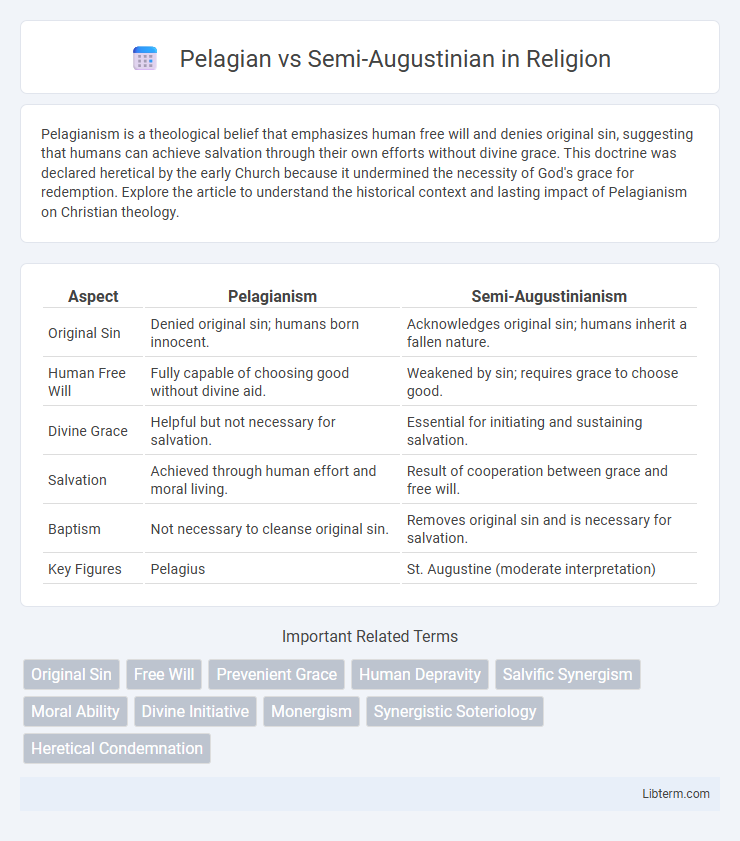Pelagianism is a theological belief that emphasizes human free will and denies original sin, suggesting that humans can achieve salvation through their own efforts without divine grace. This doctrine was declared heretical by the early Church because it undermined the necessity of God's grace for redemption. Explore the article to understand the historical context and lasting impact of Pelagianism on Christian theology.
Table of Comparison
| Aspect | Pelagianism | Semi-Augustinianism |
|---|---|---|
| Original Sin | Denied original sin; humans born innocent. | Acknowledges original sin; humans inherit a fallen nature. |
| Human Free Will | Fully capable of choosing good without divine aid. | Weakened by sin; requires grace to choose good. |
| Divine Grace | Helpful but not necessary for salvation. | Essential for initiating and sustaining salvation. |
| Salvation | Achieved through human effort and moral living. | Result of cooperation between grace and free will. |
| Baptism | Not necessary to cleanse original sin. | Removes original sin and is necessary for salvation. |
| Key Figures | Pelagius | St. Augustine (moderate interpretation) |
Introduction to Pelagianism and Semi-Augustinianism
Pelagianism, originating from the teachings of Pelagius in the 4th century, emphasizes human free will and denies original sin, asserting that individuals can achieve salvation through their own efforts without divine grace. Semi-Augustinianism, a theological position influenced by St. Augustine, acknowledges human free will but stresses the necessity of prevenient grace for any good action, maintaining a middle ground between Pelagianism and Augustinian predestination. This nuanced approach highlights the ongoing debate about the balance between divine grace and human responsibility in the process of salvation.
Historical Context and Origins
Pelagianism originated in the early 5th century, founded by Pelagius, a British monk who emphasized human free will and denied original sin, sparking significant theological controversy. Semi-Augustinian theology emerged as a response, influenced by St. Augustine's doctrines on original sin and grace, advocating for the necessity of divine grace while still acknowledging some role of human cooperation. This debate shaped early Christian understandings of sin, grace, and salvation during the late Roman Empire and early medieval period.
Key Figures: Pelagius, Augustine, and Their Followers
Pelagius, a British monk, emphasized human free will and the inherent ability to choose good without divine grace, sparking controversy in early Christian theology. Augustine of Hippo countered Pelagian views by asserting original sin's impact on human nature and the necessity of divine grace for salvation, shaping Western Christian doctrine profoundly. Their followers polarized the early Church, with Pelagianism attracting proponents who stressed moral responsibility, while Augustinianism gained dominance by integrating grace and predestination into Christian orthodoxy.
Core Doctrines of Pelagianism
Pelagianism emphasizes human free will and denies original sin, asserting that humans can achieve salvation through their own efforts without divine grace. It rejects the doctrine of innate depravity and maintains that infants are born morally neutral. Core doctrines include the belief that grace assists rather than initiates salvation, emphasizing moral perfection achievable by individual choice.
Core Doctrines of Semi-Augustinianism
Semi-Augustinianism emphasizes the indispensability of prevenient grace, which restores the human will's ability to cooperate with divine grace for salvation, contrasting Pelagianism's denial of original sin and reliance on human effort alone. It upholds the doctrine of original sin as inherited corruption affecting human nature, requiring grace not only for justification but also for sanctification and perseverance. Semi-Augustinians affirm that while human free will remains, it is insufficient without divine grace, integrating both divine sovereignty and human responsibility in the process of salvation.
The Role of Original Sin
Pelagianism denies the inherent guilt and corruption of original sin, asserting that humans are born morally neutral and capable of choosing salvation through their own free will. Semi-Augustinian theology acknowledges original sin's impact, emphasizing that while human nature is wounded, prevenient grace enables individuals to cooperate with God's grace for salvation. The primary divergence centers on whether original sin inherently deprives humanity of the ability to initiate faith without divine intervention.
Views on Free Will and Grace
Pelagianism asserts that human free will operates independently, enabling individuals to achieve moral goodness without divine grace, rejecting original sin's impact on human nature. Semi-Augustinianism maintains that free will is impaired by original sin, necessitating prevenient grace from God to initiate any genuinely good act or cooperation in salvation. Grace, therefore, is indispensable in Semi-Augustinian thought for restoring human will and enabling true moral choices, contrasting with Pelagian emphasis on autonomous human effort.
The Council of Carthage: Doctrinal Decisions
The Council of Carthage (418 AD) decisively rejected Pelagianism by affirming original sin and the necessity of divine grace for salvation, while Semi-Augustinian views were acknowledged for emphasizing human free will cooperating with grace. Key doctrinal canons condemned Pelagian claims that humans could achieve righteousness without grace, upholding Augustine's teachings on predestination and the depravity of human nature. These decisions shaped Western Christian orthodoxy by reinforcing grace as indispensable for salvation, contrasting sharply with Pelagian assertions of human sufficiency.
Lasting Influence on Christian Theology
Pelagianism emphasized human free will and denied original sin, while Semi-Augustinianism acknowledged original sin but maintained that God's grace aids human free will. The Semi-Augustinian position, rooted in Augustine's teachings, profoundly shaped Western Christian theology by affirming both human responsibility and divine grace in salvation. This synthesis influenced doctrines on sin, grace, and free will, leaving a lasting impact on Catholic and Protestant theological traditions.
Modern Perspectives and Ongoing Debates
Modern perspectives on the Pelagian and Semi-Augustinian debate emphasize the nuanced interpretations of original sin and human free will, highlighting Pelagianism's rejection of inherited guilt against Semi-Augustinian views that balance divine grace with human cooperation. Scholars analyze contemporary theological frameworks and biblical exegesis to reassess the historical charges of heresy and the implications for soteriology and moral responsibility. Ongoing debates explore the relevance of these doctrines in interdenominational dialogues and their impact on modern Christian ethics and pastoral practice.
Pelagian Infographic

 libterm.com
libterm.com